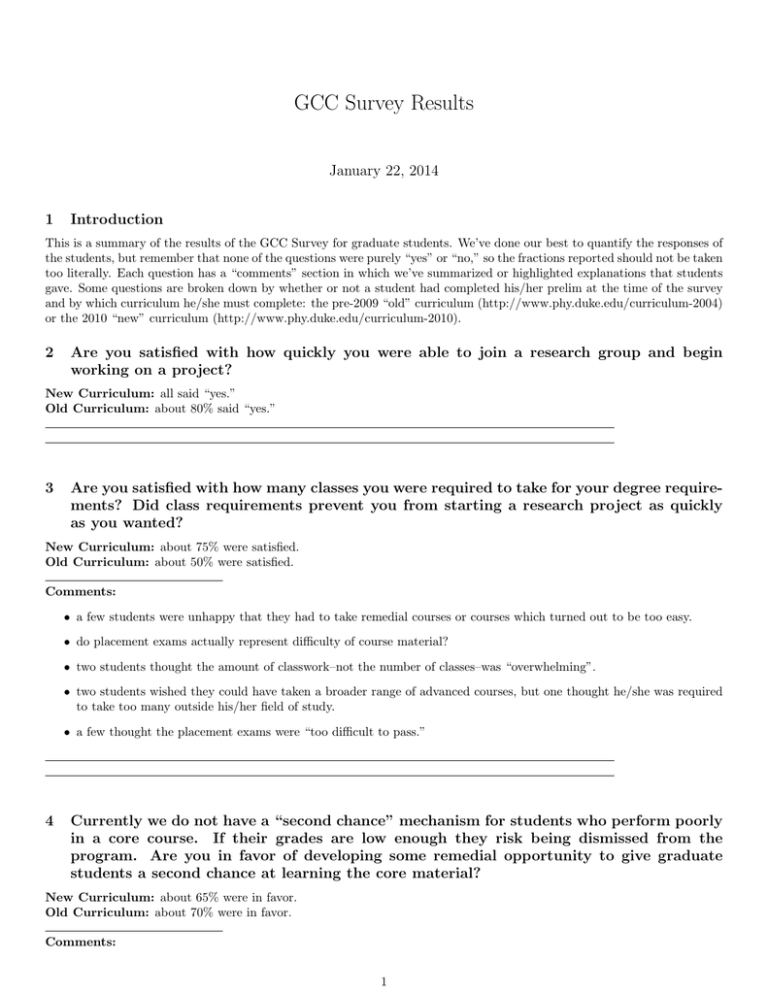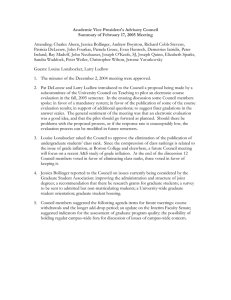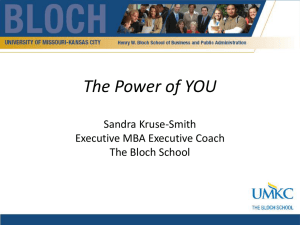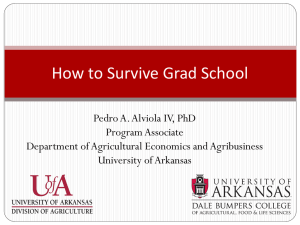GCC Survey Results January 22, 2014 1 Introduction
advertisement

GCC Survey Results January 22, 2014 1 Introduction This is a summary of the results of the GCC Survey for graduate students. We’ve done our best to quantify the responses of the students, but remember that none of the questions were purely “yes” or “no,” so the fractions reported should not be taken too literally. Each question has a “comments” section in which we’ve summarized or highlighted explanations that students gave. Some questions are broken down by whether or not a student had completed his/her prelim at the time of the survey and by which curriculum he/she must complete: the pre-2009 “old” curriculum (http://www.phy.duke.edu/curriculum-2004) or the 2010 “new” curriculum (http://www.phy.duke.edu/curriculum-2010). 2 Are you satisfied with how quickly you were able to join a research group and begin working on a project? New Curriculum: all said “yes.” Old Curriculum: about 80% said “yes.” 3 Are you satisfied with how many classes you were required to take for your degree requirements? Did class requirements prevent you from starting a research project as quickly as you wanted? New Curriculum: about 75% were satisfied. Old Curriculum: about 50% were satisfied. Comments: • a few students were unhappy that they had to take remedial courses or courses which turned out to be too easy. • do placement exams actually represent difficulty of course material? • two students thought the amount of classwork–not the number of classes–was “overwhelming”. • two students wished they could have taken a broader range of advanced courses, but one thought he/she was required to take too many outside his/her field of study. • a few thought the placement exams were “too difficult to pass.” 4 Currently we do not have a “second chance” mechanism for students who perform poorly in a core course. If their grades are low enough they risk being dismissed from the program. Are you in favor of developing some remedial opportunity to give graduate students a second chance at learning the core material? New Curriculum: about 65% were in favor. Old Curriculum: about 70% were in favor. Comments: 1 • a number of options were suggested (extra course work, retaking a new final exam, having a different professor oversee a short version of the course). • several pointed out that there should be something which students are required to pass in order to receive a degree, otherwise students who perhaps should look into other career options are allowed to “waste” several years working towards a PhD. • “it is better to bring back the qualifying exams.” • a few students thought that the professors should also be held to a higher standard of instruction for the core courses since they can determine whether or not a student completes his/her PhD. 5 There has been a proposal to use Research Assistantships as a recruitment tool and allow some faculty to hire students as RAs in their first year. Would having more flexible first-year course requirements, thus allowing you to begin your research project earlier, have attracted you to Duke? About half said “yes.” Comments: • learning to teach is an important part of graduate school. • a few said that not having to teach during the first year would have accelerated their research projects. • “it is better to get classes out of the way.” • perhaps students shouldn’t decide what kind of research they’d like to persue before having taken some introductory classes. 6 Given that we do not have a qualifying exam, in your opinion should more emphasis be placed on basic physics in the preliminary exam? Pre Prelim: < 10% were in favor. Post Prelim: about 40% were in favor. Comments: • the core courses should cover and test this material, and if the core courses are not enough of a test, the prelim is not the appropriate venue. • if basic physics is tested, it should be at least tangientially related to the student’s research. • the main purpose of the prelim should be to test the student’s readiness to begin a thesis project. 7 Would you be in favor of requiring students to pass a qualifier-type exam that focuses on core graduate-level physics? The pre-2010 qualifying exam focused on undergraduatelevel physics. New Curriculum: about 15% were in favor. Old Curriculum: about 55% were in favor. Comments: 2 • “the lack of a written qualifier was a big reason why I decided to apply to Duke.” • the core courses should cover this material; qualifiers seem redundant. • one suggested that there should be subfield-specific exams. • the variance in qualifier difficulty was too broad. • most respected institutions have qualifying exams. so should Duke. • it should be brought back to identify students who will have difficulty in the future. • the qualifier is one way to prepare a student with a broad and deep understanding of different fields. 8 Our preliminary exam structure currently does not require students to present a proposal for the PhD thesis or any original research that the committee can evaluate during the exam. Are you in favor of modifying the preliminary examination so that it includes an assessment of either of these? Pre Prelim: about 70% were in favor. Post Prelim: about 60% were in favor. Comments: • several thought this was a good idea because it forced the student to think about the end goal and allowed for early feedback from the committee. • the proposal shouldn’t be binding, and the requirements should be very flexible. • some respondents thought that in certain fields there may not be enough time for original research before the prelim. • this may make it difficult for students to change groups after their first summer. 9 On average, how many hours per week do (did) you spend on classwork (including class time, assignments, and course readings) per course? How many hours per week do you think is appropriate per class per week? New Curriculum: responses ranged from 6 to 30 hours per week per class. the average was around 12. appropriate: 10-15. Old Curriculum: responses ranged from 5 to 25 hours per week per class. the average was around 10 (very low stats). appropriate: 5-15. Comments: • according to several responses, the amount of time required was very course dependent. 10 Approximately how many hours per week do you spend on a combination of research, teaching, and coursework? How many hours per week do you think a graduate student should spend on these responsibilities? Responses ranged from 40 to 80 hours per week. The average is approximately 60. appropriate: about 55. Comments: 3 • several students pointed out that the number of hours is not as relevant the results of one’s work. 11 Do you have ample opportunity to present your research? Would you like the department to provide a venue for you to give presentations and receive feedback, perhaps in the form of a mini course? > 90% of respondents said that they have ample opportunity to present their research, but about half said that an optional minicourse could be useful. One suggested that the course be taught by a professor from outside the physics department. 12 Are you satisfied with the mini courses and advanced electives that are offered by the department? About 50% of students said they are satisfied with the courses offered. Comments: • several students said that there aren’t enough advanced electives offered often enough. • a mini course on presentations and writing was requested. • improved (or more frequent) nuclear, condensed matter, and QFT courses were mentioned. • some students feel that the better teachers (and more effort in general) are given to the undergraduate courses. • some also thought that the incentives for teaching electives and minicourses are lacking. 13 Have you attended a thesis defense since becoming a graduate student? Would you like to attend them more often? About 35% of students said they have attended a thesis defense. > 90% said they would like to attend more of them. Comments: • many students were not aware that defenses are open to those not on the thesis committee. • several said that it is strange that defenses are not well attended in our department, and that other departments at Duke and physics departments at other universities announce defenses in advance so that people can attend if they would like to. 4




